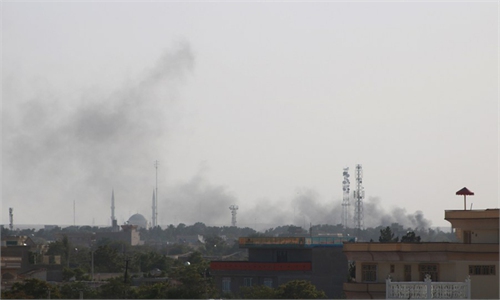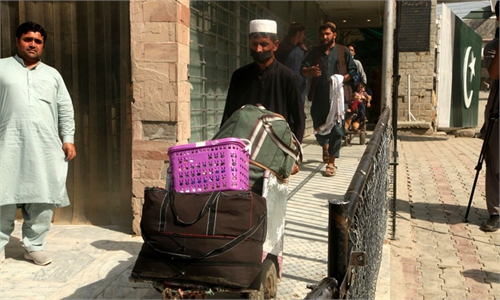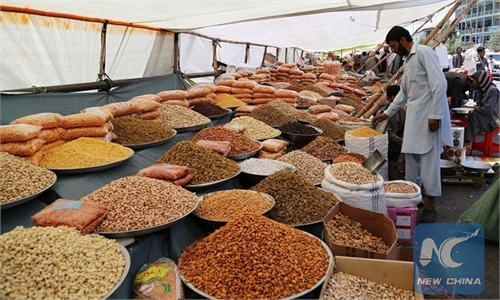COMMENTS / EXPERT ASSESSMENT
If the Taliban seek to 'build Afghanistan,' the BRI may be key

Illustration: Tang Tengfei/GT
With the chaotic evacuation of the US and its allies from the Kabul airport still underway and profound political and security uncertainty still hanging over the country, it is difficult and may even be premature at this moment to envision the kinds of social and economic development that could take place in Afghanistan going forward.
Many have begun to paint a grim picture of the country's future after the US' military withdrawal. Some even warn of an imminent humanitarian crisis. That is not to deny the potential of Afghanistan - the world's 37th largest country by population and 41st largest by landmass. But it has more to do with where the country is now and the considerable challenges and risks it faces.
Ravaged by decades of war, Afghanistan is one of the poorest countries in the world that relies heavily on international aid. In 2020, the country's GDP stood at just $19.8 billion, with over 42 percent coming from international aid. Per capita GDP stood at only $2,000 among its population of roughly 40 million. Nearly half of the country's labor force works in agriculture, with an almost no advanced industries.
Additionally, the country's infrastructure is plagued by power shortages, broken roads and bridges that are prevalent across the country. A national policy and regulatory framework is virtually non-existent at this moment. In terms of business environment, Afghanistan was ranked 173rd of 190 countries in the World Bank's 2020 Doing Business Survey.
Given such dire conditions, it is understandable that many take a rather bleak view on the future of Afghanistan, especially after the US government, the World Bank and the IMF announced suspension of aid to Afghanistan.
Still, the country's untapped potential should not be taken for granted.
For starters, Afghanistan is a relatively big country with a population larger than that of Canada and a territory larger than that of France and Japan. The country is rich in natural resources, including crucial minerals that the world desperately needs. According to various estimates, the country is sitting on mineral deposits worth between $1 trillion and $3 trillion, with much of that still unexplored.
Moreover, Afghanistan has significant geographic advantages as it lies at the crossroads of Central and South Asia. It borders with some of the world's fast-growing economies, including China and India. All of these are great advantages for Afghanistan to pursue social and economic development that will lead to meaningful change for ordinary Afghans.
However, to realize this potential, the newly empowered Taliban and the entire country face a number of acute challenges and hurdles to overcome. First and foremost, a new inclusive political structure must be formed to prevent the country from continuing the seemingly endless fighting and to shift focus toward nation building. With the US ending their military involvement in the country, there is an opportunity to do that, though that also poses a huge test for the Taliban as well as all the other political factions in Afghanistan.
Beyond the political and security situation, also crucial for any social and economic development in Afghanistan is to not only pursue friendly relations with reliable partners such as China and Russia but also actively seek participation in regional economic cooperation mechanisms, particularly the China-proposed Belt and Road Initiative (BRI).
If the Taliban aim to build Afghanistan as it has repeatedly signaled, joining the BRI could be one of the most effective pathways to achieving this goal. With the BRI's focus on massive infrastructure projects in less developed countries and regions like Afghanistan, there is simply no better alternative for Afghanistan to improve its infrastructure, foster local industries and join regional and global development.
Specially, how can the BRI help rebuild Afghanistan?
Firstly, what the country needs most urgently is to build infrastructures - power plants, roads, bridges and railways. To build that, the county needs massive amounts of investments. Given the current reality on the ground, it would be almost impossible to attract private capital from Western countries that focus on short-term returns. But under the BRI, cooperation on projects would be comprehensive and covers everything from capital investment to technology to management.
Contrary to what some anti-China forces claim to be a "debt trap," the BRI's financing structure for projects is the only effective one for infrastructure building in many poor countries that may otherwise never secure any funding given the seize and the limited short-term economic prospects of such projects. Such funding, while requiring policy and security support, also comes with no political strings attached.
Secondly, Afghanistan needs to foster local industries to achieve sustainable development. With the BRI also comes investment and expertise in fostering local industries, including mining, manufacturing, agriculture, and so on. Under the BRI, cooperation can be carried out to tap into Afghanistan's greatest potentials in areas such as mining, energy and agriculture in a mutually beneficial and sustainable fashion.
However, despite its real potential, BRI cooperation requires a safe and secure environment and enhanced political trust among parties. By all means, Afghanistan has a long way to go before any such cooperation can be carried out. There are considerable risks and hurdles not just from Afghanistan's internal situation but also from anti-China Western governments, who would take every opportunity to undermine the BRI.
But that should not stop Afghanistan from weighing its best course forward and paving the way for a brighter future for its people. As the Taliban vowed to "roll up sleeves and build Afghanistan," the BRI could offer a unique opportunity.
The author is the deputy director of the Business News Center at the Global Times. bizopinion@globaltimes.com.cn




